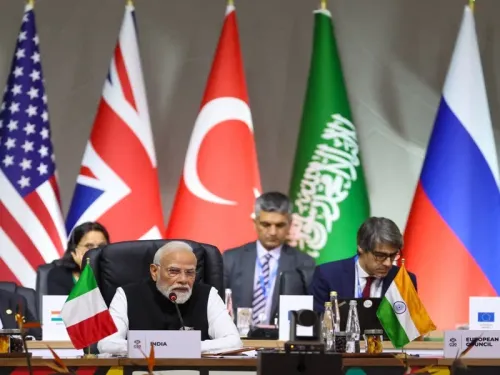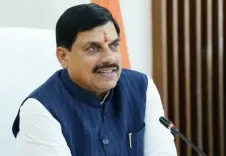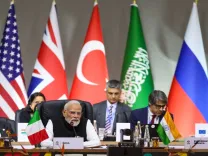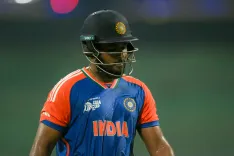Should India Be the 'Go To' Option in Any Crisis for the Subcontinent?
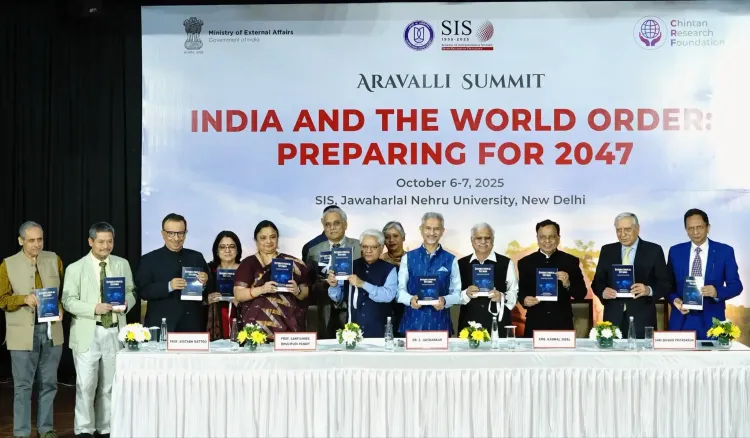
Synopsis
Key Takeaways
- India must be the first choice in crises for the subcontinent.
- Realism and national capabilities are crucial for effective policy.
- Proactive diplomacy is essential for regional stability.
- Investing in infrastructure is key to cooperation.
- India's multi-alignment strategy enhances global influence.
New Delhi, Oct 6 (NationPress) India must become the essential option during any crisis for the entire subcontinent, asserted External Affairs Minister (EAM) S. Jaishankar on Monday while addressing the complexities of the changing global landscape, its strategic consequences, and New Delhi's strategies to safeguard its national interests.
"As we look forward, it is vital to learn from our past," the EAM remarked during his address at the inaugural Aravalli Summit 2025 celebrating the 70th anniversary of the School of International Studies (SIS) at Jawaharlal Nehru University (JNU) in New Delhi.
"One of the most evident lessons is the importance of realism and the value of national capabilities. These elements were often overlooked in the initial decades after our independence, leading to known costs and consequences. Our goodwill towards neighboring nations should not be taken for granted as a reciprocal sentiment. The significance of territory and its strategic implications should never be underestimated. The defense of our borders requires appropriate infrastructure, not merely declarations of intent. If nations prioritize permanent interests, adapting policies to global changes is essential. These insights have been integrated into policy development over the last decade," Jaishankar explained.
Highlighting ten specific areas of transformation witnessed by the country during this time, the EAM emphasized that relationships must be consistently nurtured rather than addressed episodically.
"This is why we are witnessing more intensive and high-profile diplomacy within the Subcontinent, as well as with the Gulf, ASEAN, Central Asia, and other major powers. Some bilateral visits have actually occurred after decades of absence!" he remarked.
"In our region, we must take responsibility for building the infrastructure for cooperation to safeguard it against political instability. This is the core of our Neighbourhood First policy. India must be the ‘go to’ choice in any crisis for the entire subcontinent," he added.
The minister also stressed that the maritime aspects of India's interests and concerns should not be overlooked, referencing the government's SAGAR and MAHASAGAR outlook.
"We must overcome the strategic diminishment of India resulting from the Partition by reaching out to our extended neighborhoods. This rationale underpins initiatives such as Act East, Link West, C5+1, and Focus Africa. While optimizing our positioning among major powers, we should continuously cultivate our relationships with the developing world. Consequently, India proposed the Voice of the Global South Summits and initiated the Vaccine Maitri program," he stated.
EAM Jaishankar emphasized that as India's economy expands, so too will its responsibilities and the world's expectations of the nation.
"This is why we have emerged as a regular First Responder and a dependable development partner, with projects currently implemented in 78 nations across various continents. Acknowledging that we have established strong partnerships with many nations without exclusivity, our preferred approach to expanding cooperation will continue to be through agenda-based platforms, including membership in Quad, BRICS, SCO, and I2U2 among others," he elaborated.
The re-engineering of connectivity remains critically important, he noted.
"We are progressing towards increasing our options through engagement in multiple directions, as evidenced by initiatives like IMEC, the North-South Transport Corridor, the Trilateral Highway, and the Polar routes. A nation’s profile is also gauged by its ideas. In recent years, we have launched the International Solar Alliance, the Coalition for Disaster Resilient Infrastructure, the Global Bio-fuel Alliance, and the International Big Cat Alliance. We have also given a global push to yoga and wellness, millets and nutrition, and sustainable lifestyles. What may currently seem ambitious, like One Sun One World One Grid, could soon become a reality," Jaishankar stated.
Overall, EAM Jaishankar emphasized that India must operate in a multi-polar environment while preparing to emerge as a prominent pole.
"This is why multi-alignment is beneficial for us right now, and aspiring to become a leading power is a natural goal for the future. Preparations must begin now to establish a global footprint, a task that may take two generations. No region is too distant for Indian diplomacy to engage with, whether it’s the Nordic countries, the FIPIC involving Pacific Islands, West Africa, CARICOM, or CELAC," he concluded.
The gathering also featured remarks from JNU Chancellor Kanwal Sibal, Vice Chancellor Santishree Pandit, and President of the Chintan Research Foundation Shishir Priyadarshi.


